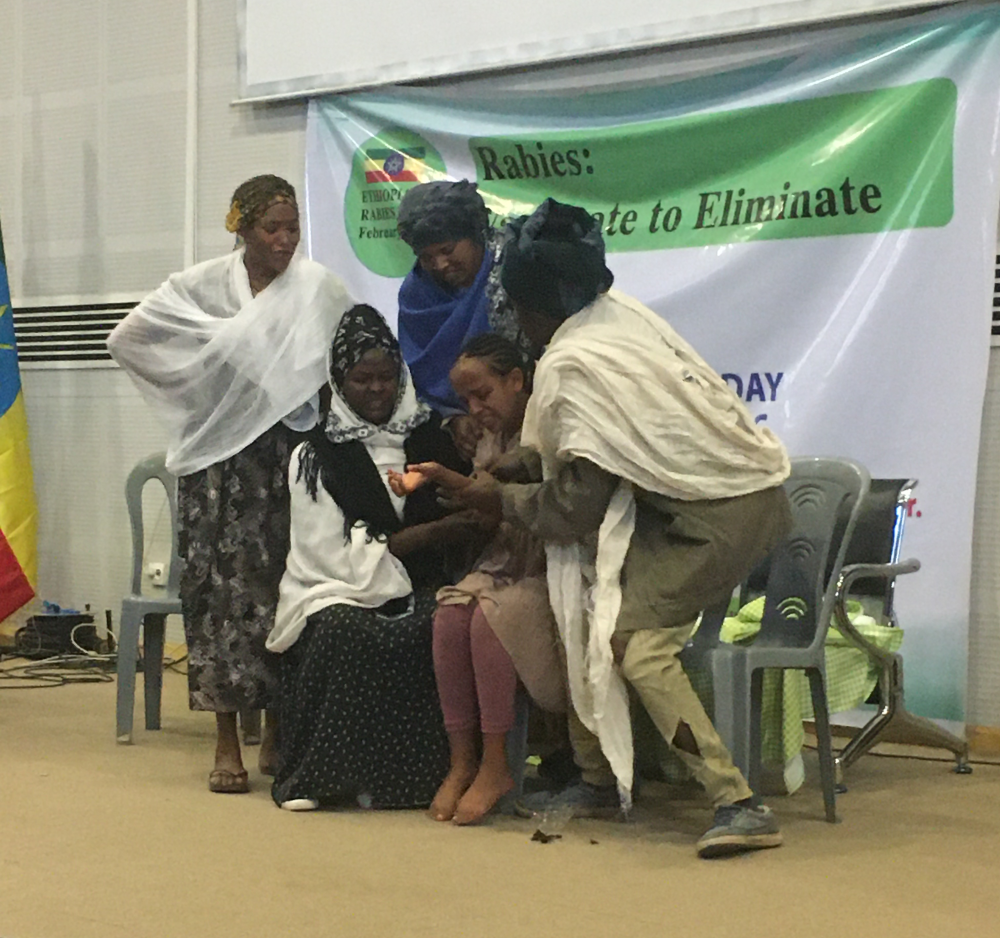Ethiopia makes their voice heard: the inaugural Ethiopian Rabies Day Celebrate renewed commitment towards rabies elimination
Being one of many rabies-endemic countries globally, Ethiopia is burdened by rabies and continues to work towards its elimination. However, the Ethiopian government and its partners have decided to take the lead and bring the fight to the front lines. World Rabies Day(September 28) is celebrated once a year, but this does not mean that rabies awareness, prevention and control initiatives should be limited to September. Considering this, Ethiopia took the initiative and celebrated Ethiopian Rabies Day for the first time on 10 February 2020 at the Ethiopian Public Health Institute (EPHI).
The event aims to expand awareness and commitment from both government, partners and the public, ensuring both renewed and continued commitment towards rabies elimination. With more than 250 multi-sectoral participants including parliament representatives, the minister of health and the minister of agriculture, high level partners, heads of regions and the engagement of all relevant governmental and non-governmental stakeholders at national and regional levels, this inaugural National Rabies Day event was a massive success.
The goal of Ethiopian Rabies Day is to increase and sustain national awareness and encourage different sectors to get involved and organize activities that would cascade life-saving information on rabies, animal bite prevention and management, and responsible pet ownership to communities. It also provides a platform to urge governments to support the implementation of national rabies prevention programs.
The day was celebrated with a host of different activities. Rabies in Ethiopia and the goal of the event was warmly expressed by Dr. Ebba EPHI, Director General, two VIPs were present to voice their commitment towards the elimination of rabies. In a keynote address from the then State Minster, Ministry of Health, H.E. Dr. Lia Tadesse (currently the Minster of Health) considered the National Rabies Control Strategy as a step forward while stressing the need to control the disease in dogs.Critically, she stressed the need to make rabies a strong national agenda and for the government to act. Dr. Alemayehu Mekonnen, Chief Veterinary Officer from the Ministry of Agriculture,indicated that Ethiopia developed a National Rabies Control Strategy to eliminate rabies by 2030, in line with the global goal. Lastly, H.E. Mr Tilahun Ayele from EFDRE, House of Representatives indicated that the house of representatives recognizes rabies as a problem, and that the deliverables from Ethiopian Rabies Day will be important for policies and strategies. Shortly after the opening speech, in a truly One Health and inter-disciplinary approach, young artists presented a drama show to raise awareness by demonstrating some of the horrors of rabies in Ethiopia.Various presentations followed and the day concluded with a mass vaccination campaign at the recently established human and animal one health rabies clinic.
The day’s events provided valuable information, and opened the opportunity for participants to exchange ideas related to the rabies burden in Ethiopia, and how much it is a critical health, social and economic issue, including existing challenges in the prevention and control of rabies. Most importantly, political will and commitment was obtained, where by high level officials understood the challenge posed by rabies in Ethiopia. They promised their continued commitment and collaboration towards elimination of rabies in Ethiopia.
Messages about rabies and the event were shared by Dr. Lia Tadesse, (State Minister, MoH), Dr. Ebba Abate (EPHI, Director General), Dr.Alemayehu Mekonnen, (Chief Veterinary Officer and delegate from MoA) and Dr. Tilahun Ayele, (EFDRE, House of Representatives).
Although Ethiopia hosted a National Rabies Day event, you can also host rabies awareness events and activities in your own country, be it on a small or large scale. Find out how with our new "Get Involved" section on our website.
Article contributed by: Dr. Baye Ashenefe, Ethiopian Public Health Institute; Dr. Meseret Bekele, Ministry of Agriculture; Dr. Sylvia Murphy, Centers for Disease Control and Prevention (CDC) and Dr. Getnet Yimer, OSU-GOHi
